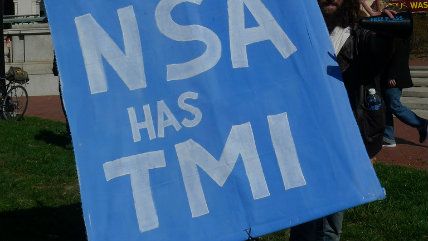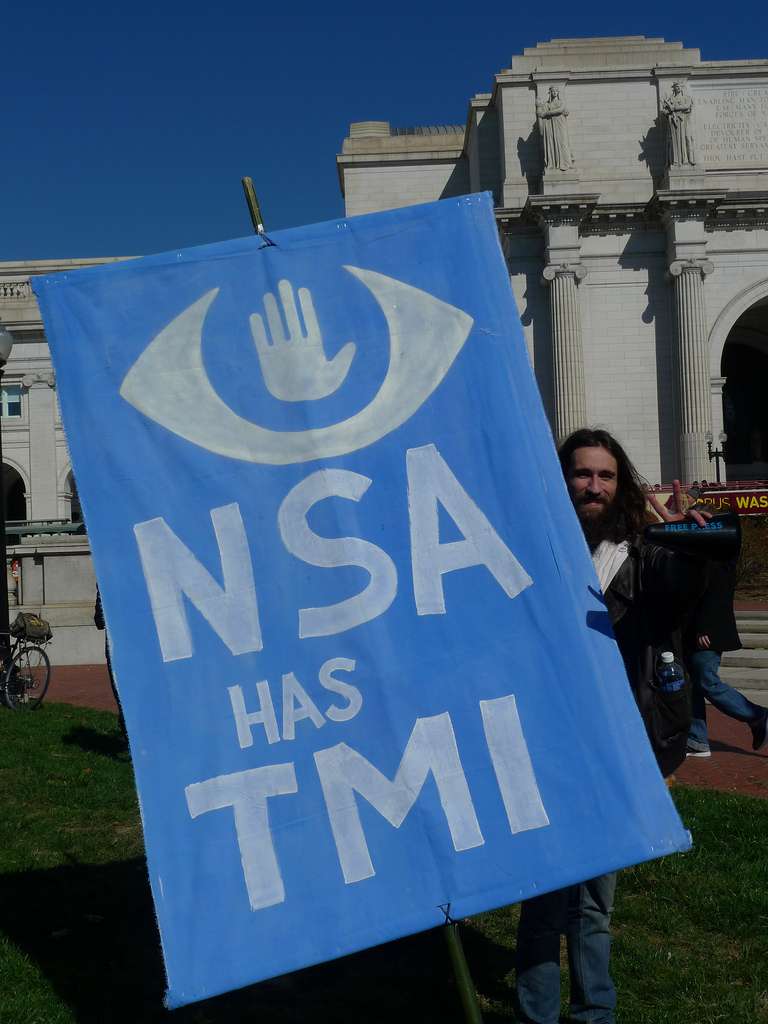Think NSA Spying Has Stopped? Think Again
Though Section 215 of the Patriot Act has expired, the NSA's other authorities to spy have not.


In an effort to draw attention away from the intelligence failures that permitted the attacks of 9/11 and create the impression that it was doing something—anything—to avoid a repeat, the federal government tampered seriously with freedoms expressly guaranteed in the Constitution. Its principal target was the right to privacy, which is protected in the Fourth Amendment.
At President George W. Bush's urging, Congress passed the Patriot Act in October 2001. This 315-page statute passed the House of Representatives with no debate, and there was very limited debate in the Senate. I have asked many members of Congress over the years whether they read this bill before they voted upon it, and I have yet to find a member who did. In the House, that would have been impossible; the bill was made available to representatives only 15 minutes prior to their vote.
This law permits FBI agents to write their own search warrants for business records, and it has been used to induce the Foreign Intelligence Surveillance Court (FISA) to issue warrants on a made-up basis to read emails and listen to telephone calls in real time. The members of Congress who voted for it were largely unaware of the liberties they were sacrificing.
The personal liberties that Congress surrendered have been a necessary bulwark against tyranny—the constitutional requirement of warrants as a precondition to searching homes and records, with warrants based on probable cause and specifically describing the place to be searched and the person or thing to be seized.
When Edward Snowden revealed the nature and extent of the domestic spying that the government unleashed upon us post-9/11 and made us all aware of its use of the Patriot Act to do so, the authors of the Patriot Act expressed outrage and anger.
What was the government doing?
The government was secretly gathering data on all of us and using warrants that were not based on probable cause and that did not specifically describe the place to be searched or the person or thing to be seized. When members of Congress realized that they, too, were being spied upon, the outrage grew. That outrage and anger metastasized into a new law enacted earlier this year, called the USA Freedom Act, which took effect this week. That law, its supporters have argued, will tame the National Security Agency (NSA) into constitutional compliance and keep its 60,000 agents and contractors out of our private affairs. In fact, it is now worse.
The new law permitted the expiration of Section 215 of the Patriot Act—the section used by the NSA to justify its collection of undifferentiated bulk data about everyone. But it also requires the telecoms and Internet service providers to retain their records for five years, and it gives the NSA instant access to those records whenever it needs them.
How can the NSA get instant access to your emails and phone calls?
Quite easily. Both the Patriot Act and the USA Freedom Act unconstitutionally do away with the probable cause requirement for warrants. Those two laws permit the Foreign Intelligence Surveillance Court to issue warrants based on the standard of "governmental needs" rather than probable cause. This is a profoundly unconstitutional standard, and one that has resulted in spying on all people all the time.
In reality, "governmental needs" is no standard whatsoever, as the government will always claim that it needs what it wants. "Governmental needs" is the hateful standard that was used by the British government when it secretly obtained warrants to enter the homes of the colonists. This provoked the Revolution and produced the Fourth Amendment.
Though Section 215 of the Patriot Act has expired, the NSA's other authorities to spy have not. The propaganda that NSA computers have been shut down is false. Its computers are still in the telecom and Internet service providers' facilities and are operated by NSA agents remotely.
Nevertheless, Section 702 of the Foreign Intelligence Surveillance Act and an October 2001 executive order by President Bush are still valid, and both bypass the Constitution and continue to permit mass collection of bulk data. Section 702 permits warrantless surveillance on Americans who speak with foreigners, and the NSA has persuaded the FISA court to issue warrants to intercept the calls of the folks to whom those Americans speak, to the sixth degree. That alone encompasses everyone in the United States.
The Bush executive order was given to all military intelligence agencies—of which the NSA is but one. It instructed the military to intercept the telephone calls of anyone in America it wishes, without seeking any warrants.
Does all this unconstitutional spying—whether pursuant to the Patriot Act, the USA Freedom Act or an old presidential executive order—keep us safe? It certainly does not keep our liberties safe. It produces too much material for the government to evaluate. The recent Paris killers communicated with one another using ordinary cellphones and emails. Yet the French government, whose legal authority to spy is broader than our government's, missed them. And the NSA, which spies on the French government, missed them.
The Fourth Amendment has numerous virtues, but foremost among them is a double-sided coin. One side is the requirement of individualized probable cause. When followed, that prevents the government from using general warrants (search wherever you want, and seize whatever you find), the hallmark of totalitarian governments. By confining the government's authority to search only to those cases about which it has suspicion, the other side of that coin forces the government to focus on the bad guys. When it does that, the government will be far likelier to stop them than when it gathers all it can about everyone.
COPYRIGHT 2015 ANDREW P. NAPOLITANO || DISTRIBUTED BY CREATORS.COM
Editor's Note: As of February 29, 2024, commenting privileges on reason.com posts are limited to Reason Plus subscribers. Past commenters are grandfathered in for a temporary period. Subscribe here to preserve your ability to comment. Your Reason Plus subscription also gives you an ad-free version of reason.com, along with full access to the digital edition and archives of Reason magazine. We request that comments be civil and on-topic. We do not moderate or assume any responsibility for comments, which are owned by the readers who post them. Comments do not represent the views of reason.com or Reason Foundation. We reserve the right to delete any comment and ban commenters for any reason at any time. Comments may only be edited within 5 minutes of posting. Report abuses.
Please to post comments


They really think we bought the idea that the NSA would cut back on their surveillance? How naive does government think we are?? Some of us weren't born yesterday.
Unfettered access to everyone's communication gives the government much more than the ability to track bad guys. It gives them leverage. On everyone. If you have any communication at all, sooner or later you are going to make a statement they can take out of context, send it to the news, and create a narrative about you that you then have to try and disprove. All you have to do is run afoul of someone in the government with the juice to make you a target. Your only recourse is to keep a religiously low profile, and never rant about what this or that idiot in the government is doing. Good luck with that. According to rumors, we're all breaking some law or other that we don't even know exists. This is the system we exist in, again according to rumor. With the system we currently have in place, our only safety comes from being just one of millions. Just like a school of minnows being attacked by sharks, most will survive because the sharks can't eat everyone. But the sharks can certainly eat ANY one. I'll bet most people in the government aren't trying to skewer John and Jane Doe, but it's not because it's not possible. That's the reality of what the judge is saying. That's the current reality. We have the illusion of legal freedom defined by the Constitution just because there are too many of us to chase at once. If Big Brother focuses on you, you're screwed if you don't have vast sums to fund your defense, and then it's a coin toss...
Yes, good luck finding anyone willing to take on the NSA in politics in 15 years. They'll send someone to meet with you and blackmail you with something you'd said 25 years before... and that's how you get a truly permanent bureaucracy.
Agreed. J. Edgar Hoover was a toddler compared to the new capabilities they have in place. If they dig for dirt long enough, they can leverage any politician in office. I'm guessing they probably need 10 minutes to dig on average. Then a quick personal message to uncooperative politician X, and now he's cooperative - forever. I expect the head of the NSA has more influence than any average senator, if they care about an issue enough to get involved. They'll get the rules they want. Whether we like it or not.
When Redcoats were barging into house, rifling through papers, all on some nebulous "warrant", of course it led to the Revolution. There was genuine terror there. Now we tap away at our keyboards, shoot the shit on our phones, manage our bank records online, etc. all without ever knowing some spook is watching the whole thing. Or rather, it's easy to forget.
Maybe some astute coder out there can come up with some way for us to see exactly who is snooping into our private electronic lives and when. Maybe seeing the digital equivalent of someone barging into your private space and throttling through your private business will stir us like it did the Fathers....
I turned to an automated system where I can manage my leads. This autopilot system is working for me now, but I didn't start this way. I think it's worth a try when you get to the point of wanting some automation.[][]
Here's a link for anyone interested in this strategy, and it's free
??????---- http://www.buzznews99.com
If and or when NSA stops "spying" it's reason d'etre will disappear, as what purpose did it ever serve but to spy, the question of course being on who?
NSA: Not Sleeping Anytime.
NSA Spying Has not Stopped and it stills